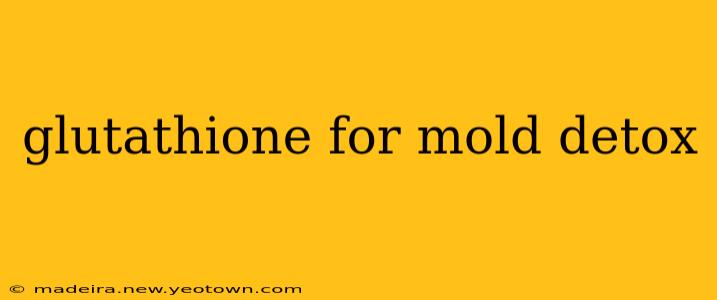Mold. Just the word conjures up images of damp basements, musty smells, and potential health problems. And for many, those problems are very real. Exposure to mold and its toxins, mycotoxins, can trigger a range of debilitating symptoms, from headaches and fatigue to more severe respiratory issues and immune dysfunction. Enter glutathione, a powerful antioxidant that's increasingly being explored for its role in supporting the body's natural detoxification processes, including those related to mold exposure. But does it truly work? Let's delve into the science and explore the potential benefits and limitations of using glutathione for mold detoxification.
My story began with a persistent cough and overwhelming fatigue. Doctors ran tests, but nothing seemed conclusive. It wasn't until a specialist suggested mold testing of my home that the pieces started to fall into place. The levels were alarmingly high. After extensive remediation, I embarked on a journey to regain my health, and that's where I discovered the potential of glutathione. My experience, coupled with ongoing research, fuels my passion for sharing accurate information about this powerful molecule.
What is Glutathione and How Does it Work?
Glutathione is a tripeptide—a molecule composed of three amino acids: cysteine, glycine, and glutamate. It's naturally produced by the body and plays a crucial role in numerous cellular processes, acting as a primary antioxidant and a key player in detoxification pathways. Essentially, it helps neutralize harmful free radicals and supports the liver's ability to process and eliminate toxins. In the context of mold detoxification, this is particularly relevant, as mycotoxins can overwhelm the body's natural defenses.
Does Glutathione Help with Mold Toxicity?
While research is ongoing, there's growing evidence suggesting that glutathione plays a crucial role in mitigating the effects of mycotoxin exposure. Its antioxidant properties help protect cells from damage caused by these toxins. Furthermore, it supports the activity of enzymes involved in phase II detoxification—the process where toxins are transformed into water-soluble compounds, making them easier for the body to eliminate.
How to Increase Glutathione Levels Naturally?
Boosting your glutathione levels can be achieved through various lifestyle choices:
- Diet: Consume foods rich in cysteine, such as eggs, garlic, and broccoli.
- Supplements: Consider supplements containing N-acetyl cysteine (NAC), a precursor to glutathione. Always consult with a healthcare professional before starting any new supplements.
- Lifestyle: Prioritize sleep, manage stress, and engage in regular exercise. These factors indirectly influence glutathione production.
Common Questions about Glutathione and Mold Detox
How effective is glutathione in treating mold toxicity?
The effectiveness of glutathione in treating mold toxicity varies from person to person. While it supports the body's natural detoxification processes, it's not a cure-all. Its success depends on several factors, including the severity of the exposure, the individual's overall health, and the presence of other underlying health conditions.
What are the side effects of glutathione supplementation?
Generally, glutathione supplementation is well-tolerated. However, some individuals may experience mild side effects such as nausea, diarrhea, or headaches. Rarely, more serious side effects can occur. It's crucial to consult a healthcare professional before starting any supplementation.
What are some alternative therapies for mold toxicity?
Alongside glutathione, other therapies may be beneficial in addressing mold toxicity. These include removing mold sources from the environment, using air purifiers, and adopting a healthy diet and lifestyle. Specific therapies should be discussed with a healthcare practitioner.
Can glutathione help prevent mold toxicity?
While glutathione can't prevent mold exposure, it may help support the body's ability to cope with mycotoxin exposure. Maintaining healthy glutathione levels can be considered part of a preventative strategy, especially for individuals at high risk of mold exposure.
Is glutathione safe for long-term use?
The long-term safety of glutathione supplementation is still under investigation. While generally considered safe for short-term use, ongoing research is needed to establish its long-term safety profile. Consult a healthcare professional for guidance on appropriate dosage and duration of use.
Disclaimer: This information is for educational purposes only and should not be considered medical advice. Always consult with a qualified healthcare professional before making any decisions related to your health or treatment. The experiences shared are personal accounts and may not be representative of everyone's experience.

